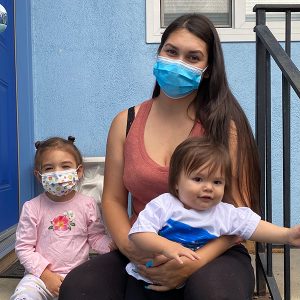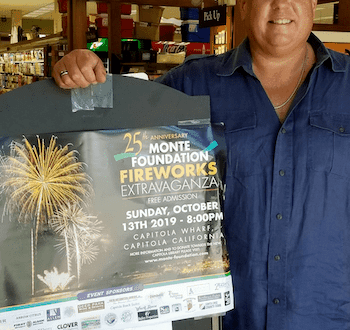Head Start Perseveres
Caring for the Children of Those Who Care for the Rest of Us
By Suki Wessling
 “Three-quarters of the folks I work with never used email until May!” exclaims Maria Castro, director of Migrant/Seasonal Head Start, which serves the largely Latino migrant worker community in South County. Head Start, the half-century-old early childhood education program, has strong bipartisan support—a rarity in these times. Castro’s corner of Head Start, which is specifically designed for the migrant worker population, went through a painful transition last spring.
“Three-quarters of the folks I work with never used email until May!” exclaims Maria Castro, director of Migrant/Seasonal Head Start, which serves the largely Latino migrant worker community in South County. Head Start, the half-century-old early childhood education program, has strong bipartisan support—a rarity in these times. Castro’s corner of Head Start, which is specifically designed for the migrant worker population, went through a painful transition last spring.
“We couldn’t have our traditional monthly meetings and trainings,” Castro explains. Her care providers had to learn Zoom, and Castro had to try to make sense of chaos. “At the beginning, the [federal] requirements were changing every other week.”
A triple threat challenges a fragile program
Erendira Guerrero is the Director of the Child and Family Development Programs at Encompass Community Services, which administers Head Start centers. In the early days of the pandemic, Guerrero called the government daily, checking to make sure that she had heard correctly: the feds were letting coordinators know that they could be flexible with requirements. “We’re heavily regulated! We were like, are they kidding? Is this for real?”
It was for real, and Head Start coordinators and providers shifted to providing services during a pandemic that was piled on top of existing stressors.“There was a triple threat,” Guerrero explains. “Natural disaster, racism, Covid. For us it’s probably been four years that we’ve been supporting families in crisis mode.”
Because families that benefit from Head Start in our county are overwhelmingly Hispanic, immigration raids made some providers and participants wary of participating in a government-sponsored program. That fear was compounded by the pandemic and then the fires.
“There’s some real concern about the mental health of fear being in people’s lives for such a long time now,” Guerrero points out. “Will we be together? Will somebody get sick?”
Passion for a cause
Most of us are probably vaguely aware of Head Start as a government-funded, pre-kindergarten program. Some of us may remember headlines about a study that showed that Head Start conferred no lasting benefit to kids—though not the follow-up stories that showed the study was deeply flawed.
If you ask people who are involved in local Head Start, however, there is no debate that Head Start is necessary, useful, and effective.
“I drank the Head Start Kool-Aid many years ago!” Erendira Guerrero jokes. “I fell in love with the structure of not just working with the child but with the family and the community.”
“The childcare industry is fragile,” explains Sita Moon, coordinator of the Child Development Resource Center at the Santa Cruz County Office of Education. “There are high expectations but very little financial reward. But without a sufficient supply of childcare our economy is affected.”
Moon has a lot to coordinate. Traditional Head Start offers only Licensed Childcare Centers, which provide group care in institutional settings. These were forced to close last spring and now deliver their services online.
Migrant Head Start administers Centers but also Licensed Family Childcare Homes, where an adult runs a small, independent daycare out of the home where they reside. These homes, with guidance by Maria Castro, were allowed to stay open, with restrictions.
Persevere and thrive
Maria Castro saw ingenuity and flexibility on the part of the families she works with in Migrant Head Start as they tried to keep the Licensed Homes open. “At first, everything that’s inside, they have a modified version outside. That made it easy to get the children outside to do social distancing. Then the smoke came. We were running around trying to get air purifiers for their homes. Once the smoke went away, we were like, ‘Oh, good, it’s just a pandemic!’”
Erendira Guerrero said that Head Start had to adapt quickly to new needs. “When we started the pandemic, there were fewer resources, especially for families who didn’t have a child in the public school system. For example, there was a lag time before we were ready to provide diapers and formula because you can’t normally find those things at a food bank.”Despite the challenges, the program has risen to the occasion, exceeding its original mission as a childcare program. As a result of the pandemic, says Castro, “We are the main source of information to farmworker parents. We’re sending them information about Covid and how to protect themselves twice a month.” Impressively, there have been very few Covid infections tracked to Family Childcare Homes.
The bad news is that the program has truly been devastated by the triple threat. The childcare centers have been closed indefinitely.“We’re worried about all the folks that are on unemployment now from the centers that are closed,” Sita Moon explains. “Will there be jobs for them when the centers are able to open?”
The program has correspondingly seen a drop in enrollment—about half of the families have dropped out or are no longer in contact. Homeless families, who can no longer visit centers for services, are of particular concern.
But in every cloud, the silver lining
To be involved in a program that serves young children, you need a certain amount of unshakable optimism. And everyone involved can cite the ways in which the program and its participants have blossomed during these difficult times.“On the positive, the parents have been so thankful,” Maria Castro reports. “These are folks that if they don’t have childcare, they can’t work in the fields, and if they don’t work there’s no income. They have no savings. We have also been able to pay the childcare providers when they have to shut down.”
Castro also points out that her providers, many of them women in their sixties, are particularly proud of being essential workers who have new training in technology.
“For families we work with, we are their primary source of connection,” Erendira Guerrero says. “We work with them and connect them with other families and resources. We never closed our services, but when we closed our in-person services, staff immediately jumped into making home wellness calls to the families. For those families that were more isolated this was really helpful. We did lose connection with some of our highest risk families, like our families that were homeless. So we had to work with the county and the foster families to rebuild that connection.”
Sita Moon says that these trying times have only strengthened the resolve of those who work to make sure that childcare is available to everyone.
“Early educators are incredibly strong and resilient and our community is fortunate to have so many people engaged in this work.”
Suki Wessling is a local writer and teacher and the mother of two college students. Read more at SukiWessling.com.








